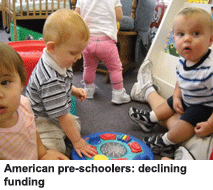Barack Obama likes to call education “the currency for the information age”. His presidency has brought a big shift in America’s priorities, devoting more effort and resources — and an extra $2 billion (Rs.10,800 crore) — to children who have not yet started formal schooling.
That is part of an international trend. South Korea plans to extend early education provision to all three and four-year-olds this year. Turkey has ambitious plans too. Preschool education has been long neglected the world over. “90 percent of the brain develops between the ages of zero to five, yet we spend 90 percent of our dollars on kids above the age of five,” says Timothy Knowles of the University of Chicago. This is now changing. Academic studies, including neuroscience, have highlighted the long-term effects of experiences in a child’s early years.
 The most recent report by the OECD, a rich-world think tank in 2009, found that 15-year-olds who had attended preschool for more than a year, performed better (even accounting for socio-economic background) than those who had attended for only a year or not at all. In Belgium, France and Israel, pupils educated in preschools have much higher reading scores than those who stayed home.
The most recent report by the OECD, a rich-world think tank in 2009, found that 15-year-olds who had attended preschool for more than a year, performed better (even accounting for socio-economic background) than those who had attended for only a year or not at all. In Belgium, France and Israel, pupils educated in preschools have much higher reading scores than those who stayed home.
Yet establishing the precise link between time in preschool and later achievement is difficult. Even defining the term is difficult: it is also known as nursery, pre-K, and early childhood education, and children range from tiny tots in some countries to six-year-olds in others. Measuring quality is hard. The amounts taxpayers devote to it vary, as does the balance between state and private provision. National attitudes to the right way to spend early childhood years differ. Too much pressure too early may set children up for failure later, notes Alan Smithers, a British education expert.
Israel starred in the OECD report and following a wave of social protests in 2011 has put effort and money into further reforms. Aliza Marriott, a public relations consultant living in Jerusalem, is proud that her children in preschool are “much more advanced” than she was at their age.
Yet the key to success, if any, is unclear. Measuring other data, a report on preschool availability and teaching standards called ‘Starting Well’ (compiled for the Lien Foundation by the Economist Intelligence Unit) placed Finland on top (it scored direly in the OECD study). At least 98 percent of children aged five or six are in preschool education there. Finland also dominates the overall league tables for education performance, so perhaps the scope for improvement is slight.
Other enthusiastic providers of preschool education like Sweden, Norway, France, Belgium and Denmark do not score too highly on attainment in later education, whereas Japan, which combines early-years provision with a fiercely competitive exam culture, excels. The greatest success in preschool provision probably comes from reaching the children who need it most, from poor, neglectful or unstable families. But this is hard. Britain’s Sure Start scheme, introduced in 1999, proved popular: motivated parents liked the extra stimulation for their children. But it failed to reach some of the neediest children, whose parents could not or would not ensure their attendance.
Some of the fastest changes, however, are happening where local politicians have free rein. Michael Bloomberg, mayor of New York, is opening its first “cradle-to-kindergarten” school later this year for 130 under-fives from poor families, an idea copied from a similar scheme in Chicago. Pre-kindergarten enrolment has increased in New York from 40,000 a decade ago to 58,000 in 2012 and the mayor wants to add 4,000 full-day places in the most deprived areas of the city. Early-years learning is not a magic solution to the elusive modern quest for social mobility. But it can help focus tiny minds on aspiration and bigger ones on how to support it.
(Excerpted and adapted from The Economist)





















